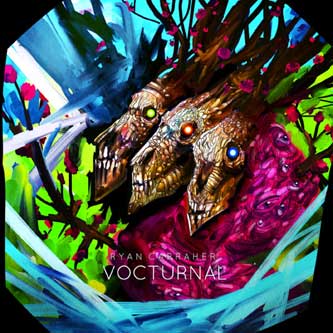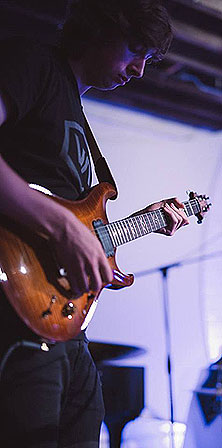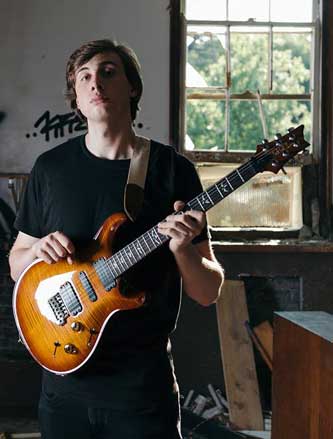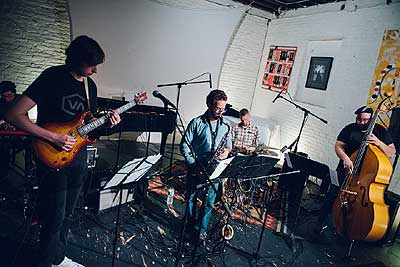 Breaking
new ground in the world of 21st century modern jazz, guitarist Ryan
Carraher steps out on his own with his 2016 CD Vocturnal.
One look at his resume is most impressive. Graduating from Berklee
School of Music with the Berklee guitar achievement award, Ryan has
played with Allan Holdsworth, Leslie West, Pete Best, Sly Stone and
much more. All this and the guy is still 23 years young. On Vocturnal,
Ryan joins forcers with some like-minded musicians, including
Brandon Wilkins (sax) and the results make for a beguiling
album of instrumental, experimental guitar-based fusion. Speaking
about his CD, Ryan tells mwe3.com, "The name Vocturnal is
a combination of the words Voyage and Nocturnal. Most of these songs
were written at night and do have a dark vibe so it seemed to fit
the music appropriately but in an abstract way. It was a way for me
to express new ideas and explore new sounds I was inspired by. I am
very lucky to have such an amazing group of musicians playing with
me on this record." Described as an album of modern jazz
that pushes the boundaries of improvisation, Vocturnal also
combines influences from avant-garde classical masters like Schoenberg
and Stravinsky. Fans of Pat Metheny’s work with Ornette Coleman
will find much to like about Ryan Carraher and his intriguing Vocturnal
album. www.ryancarraher.com
Breaking
new ground in the world of 21st century modern jazz, guitarist Ryan
Carraher steps out on his own with his 2016 CD Vocturnal.
One look at his resume is most impressive. Graduating from Berklee
School of Music with the Berklee guitar achievement award, Ryan has
played with Allan Holdsworth, Leslie West, Pete Best, Sly Stone and
much more. All this and the guy is still 23 years young. On Vocturnal,
Ryan joins forcers with some like-minded musicians, including
Brandon Wilkins (sax) and the results make for a beguiling
album of instrumental, experimental guitar-based fusion. Speaking
about his CD, Ryan tells mwe3.com, "The name Vocturnal is
a combination of the words Voyage and Nocturnal. Most of these songs
were written at night and do have a dark vibe so it seemed to fit
the music appropriately but in an abstract way. It was a way for me
to express new ideas and explore new sounds I was inspired by. I am
very lucky to have such an amazing group of musicians playing with
me on this record." Described as an album of modern jazz
that pushes the boundaries of improvisation, Vocturnal also
combines influences from avant-garde classical masters like Schoenberg
and Stravinsky. Fans of Pat Metheny’s work with Ornette Coleman
will find much to like about Ryan Carraher and his intriguing Vocturnal
album. www.ryancarraher.com
mwe3.com
presents an interview with
Ryan
Carraher
the VOCTURNAL interview
 mwe3:
Can you tell us where you’re from originally and where you live
now and what you like best about it?
mwe3:
Can you tell us where you’re from originally and where you live
now and what you like best about it?
Ryan Carraher: I grew up in northern New Jersey and I moved
up to Boston to study at Berklee and have lived there ever since.
I really like the accessibility and history that is found in Boston.
Also, there is a very supportive and diverse music scene which really
inspires me.
mwe3: Tell us about writing and recording Vocturnal. When
was the album written and recorded and who plays with you on the CD
and what is the chemistry like between you and your band?
Ryan Carraher: Vocturnal was written periodically throughout
my years at Berklee College of Music and it was recorded in November
of 2015, a few months before I graduated. In many ways, this record
represents my musical mind expanding and exploring various textures
and ideas I discovered while working at Berklee. It was a way for
me to express new ideas and explore new sounds I was inspired by.
I am very lucky to have such an amazing group of musicians playing
with me on this record. On drums we have Steve Wilkinson, on sax Brandon
Wilkins, on bass Greg Toro and on keys Evan Waaraama. There is great
chemistry between all of us for sure. All of these guys are extraordinary
players and extremely creative people so they breathed life in to
these tunes and absolutely gave each tune a vibe of its own.
mwe3: Tell us about some of your musical influences as you
mention that Vocturnal was greatly influenced by 20th century
classical composers including Igor Stravinsky. How about other jazz
and guitar influences that permeate the album?
Ryan Carraher: I have always been interested in so many different
kinds of music. I have spent so much time studying classic rock, prog
rock, metal, jazz, fusion, classical etc. On Vocturnal a lot
of the harmonic language and compositional technique is certainly
inspired by 20th century composers like Stravinsky, Bartok and Messiaen.
In terms of the jazz guitar influences my biggest one is Allan Holdsworth.
He is certainly a player that understands and embraces his own musical
voice to create something fresh and new and that is my goal as well.
I am also a huge fan of Ben Monder, Mike Moreno, Bill Frisell, Kurt
Rosenwinkel and Tim Miller.
mwe3: How long have you been playing the guitar and tell us
about the guitars and amps and effect that you recorded the Vocturnal
CD with? Are there any acoustic guitars on the CD as well?
 Ryan Carraher:
I have been playing for 11 years now. On Vocturnal the main
guitar I used was my Paul Reed Smith 513. This guitar has been my
main workhorse over the past few years and it resonates extremely
well with me. I also used my custom Palir Titan on a few tracks, another
amazing guitar. In terms of amps I used a Fractal Audio Axe-Fx Ultra
for the whole album, I actually just went direct into the board with
it. I used some of the delay and chorus effects within the Axe-Fx
on the record but live I often use an Electro-Harmonix HOG2, Earthquaker
Devices Rainbow Machine, Srtymon Big Sky and a Red Panda Particle.
These will all certainly be making an appearance on my next release.
Ryan Carraher:
I have been playing for 11 years now. On Vocturnal the main
guitar I used was my Paul Reed Smith 513. This guitar has been my
main workhorse over the past few years and it resonates extremely
well with me. I also used my custom Palir Titan on a few tracks, another
amazing guitar. In terms of amps I used a Fractal Audio Axe-Fx Ultra
for the whole album, I actually just went direct into the board with
it. I used some of the delay and chorus effects within the Axe-Fx
on the record but live I often use an Electro-Harmonix HOG2, Earthquaker
Devices Rainbow Machine, Srtymon Big Sky and a Red Panda Particle.
These will all certainly be making an appearance on my next release.
mwe3: How do you stay in shape as a guitarist and composer?
Are there exercises that you do to keep your fretboard skills in peak
form and how about compositional studies? Do you practice a lot and
do you challenge yourself as a composer?
Ryan Carraher: I always make a point of practicing slow which
keeps my fretboard knowledge up to snuff. I find that I can really
focus on how things sound and find new pathways through scales and
harmonic materials when I practice very slow. I also do a lot of free
improvisation trying to bypass any expectations I may impose on myself
and simply try to play what I hear. In terms of composition, I do
like to challenge myself often by limiting myself. For example, I’ll
limit myself to a single harmonic source such as a scale, a melodic
fragment, a tone row, an intervallic sketch... and see what I can
create within these parameters.
mwe3: What was it like studying at Berklee and did you choose
a major to study or did you choose to go through the program for a
degree?
 Ryan
Carraher: At Berklee I worked with some amazing teachers that
really worked with me to discover my own musical voice. It was a very
demanding 4 years but definitely very musically worthwhile. I majored
in guitar performance.
Ryan
Carraher: At Berklee I worked with some amazing teachers that
really worked with me to discover my own musical voice. It was a very
demanding 4 years but definitely very musically worthwhile. I majored
in guitar performance.
mwe3: What was it like working with co-producer Keith Asack
and what did he bring to the mixing and mastering of the album as
well?
Ryan Carraher: Working with Keith was great. All of us in the
band are perfectionists and so is Keith so he certainly kept us on
our toes. We recorded the album live and even if one little thing
was off we would be back in the live room to do another take. He really
gave us the opportunity to listen to ourselves and how we sound individually
and, more importantly, as a group.
mwe3: How about the cover art for Vocturnal? It seems
humorous yet quite scary at the same time. And how did you choose
the title for the album and how does the title fit the music?
Ryan Carraher: The album cover certainly doesn’t scream
“jazz”! That was a conscious choice on my part. I believe
the music and even the tones used on the record have a dark undertone
and the cover certainly has dark and abstract features to reflect
that. The name Vocturnal is a combination of the words Voyage
and Nocturnal. Most of these songs were written at night and do have
a dark vibe so it seemed to fit the music appropriately but in an
abstract way.
 mwe3:
With Vocturnal out in 2016 have you been playing concerts and
have you given thought yet as to what musical direction you’d
like to go in next and what kind of album you’d like to produce
as a follow up to Vocturnal in early 2017?
mwe3:
With Vocturnal out in 2016 have you been playing concerts and
have you given thought yet as to what musical direction you’d
like to go in next and what kind of album you’d like to produce
as a follow up to Vocturnal in early 2017?
Ryan Carraher: We have been playing constantly since the album
came out in March 2016. It has been great fun and we have been meeting
and playing with some inspiring and humbling people. I am hard at
work at a follow up to Vocturnal. It is definitely a different
musical direction than Vocturnal. There are larger instrumentations,
more exploration of 20th century composition techniques as well as
a greater emphasis on collective improvisation, aleatoric devices
and musical symbolism. I am looking forward to getting in the studio
sometime in 2017.



